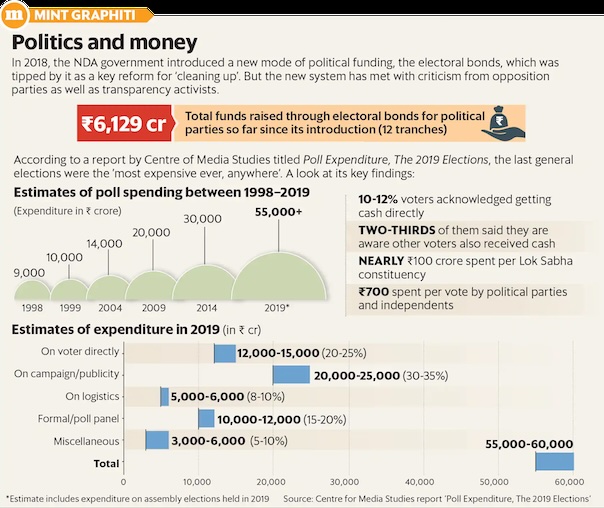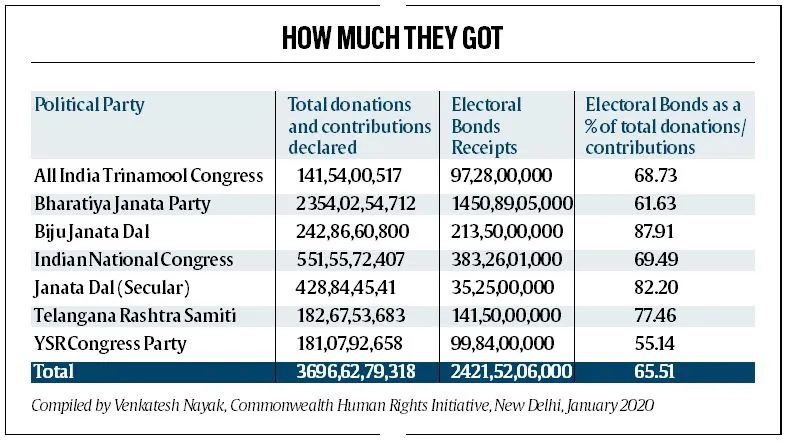Summary
- The Election Bond Scheme was launched by the Indian government in 2018, allowing anonymous donations to political parties via bonds issued by the State Bank of India, aimed at increasing transparency in political funding.
- Despite initial optimism, the scheme faced criticism for lacking transparency, as it enabled donors to contribute anonymously, raising concerns about undisclosed influences on policymaking.
- Analysis indicated a disproportionate advantage to the ruling party, with the Bharatiya Janata Party (BJP) receiving the majority of funds through these bonds, highlighting potential biases in the distribution of donations.
- Legal and ethical concerns emerged regarding the potential for an influx of unaccounted money and foreign influence in the political system, prompting challenges in the Supreme Court of India and calls for reform to address these issues.
Background
The Election Bond Scheme was introduced by the Government of India in 2018 as a purported measure to ensure transparency in political funding. An election bond is a financial instrument akin to a promissory note, enabling citizens and corporate entities to donate to political parties anonymously. The bonds are issued by the State Bank of India (SBI) and are available for purchase for a period of ten days at the beginning of each quarter. The political parties can then encash these bonds within a stipulated time frame.

Implementation
The scheme allowed for the purchase of bonds in multiple denominations, ranging from ₹1,000 to ₹1 crore, thereby making it accessible to a wide range of donors. The anonymity clause was introduced to protect donor identities, with the objective of encouraging more contributions free from fear of retribution or backlash.
During its initial phases, the scheme was met with enthusiasm, as it seemed to offer a cleaner alternative to the previously unregulated donations, often made in cash. The bonds quickly became a popular means for corporates to contribute to political parties, given the ease of transaction and lack of disclosure requirements.

Subsequent Issues and Concerns
- Lack of Transparency: Contrary to its intended purpose, the anonymity provided by the scheme raised significant concerns about transparency. Critics argued that it made it impossible to know the sources of political funding, potentially increasing the influence of undisclosed donors on policymaking and governance.
- Disproportionate Beneficiaries: Reports and analyses of the scheme’s utilisation indicated a disproportionate benefit to the ruling party. According to the data released by the State Bank of India, a significant majority of the bonds purchased were encashed by the ruling Bharatiya Janata Party (BJP). For instance, in the financial year 2017-2018, the BJP was reported to have received 94.5% of the funds through election bonds.
- Legal and Ethical Concerns: The scheme was challenged in the Supreme Court of India, with petitioners arguing that it could lead to an influx of black money into the political system, thus undermining the integrity of the electoral process. Concerns were also raised about the potential for foreign interference, given the lack of scrutiny over the source of funds.
- Impact on Electoral Democracy: The opaqueness surrounding the donor identities and the amounts donated has led to apprehensions regarding the fairness and integrity of the electoral process. The fear is that policy decisions could be unduly influenced by big donors, who remain hidden from public scrutiny.
Analysis
- The Election Bond Scheme, while innovative in its approach to streamlining political donations, has encountered significant challenges that call into question its efficacy in enhancing transparency and reducing the influence of unaccounted money in Indian politics.
- The debate surrounding the scheme underscores the complexities involved in reforming political financing in a manner that balances the need for transparency with the protection of donor identities.
- Further scrutiny and potential reforms may be necessary to ensure that the objectives of the scheme are met without compromising the democratic values it seeks to uphold.
